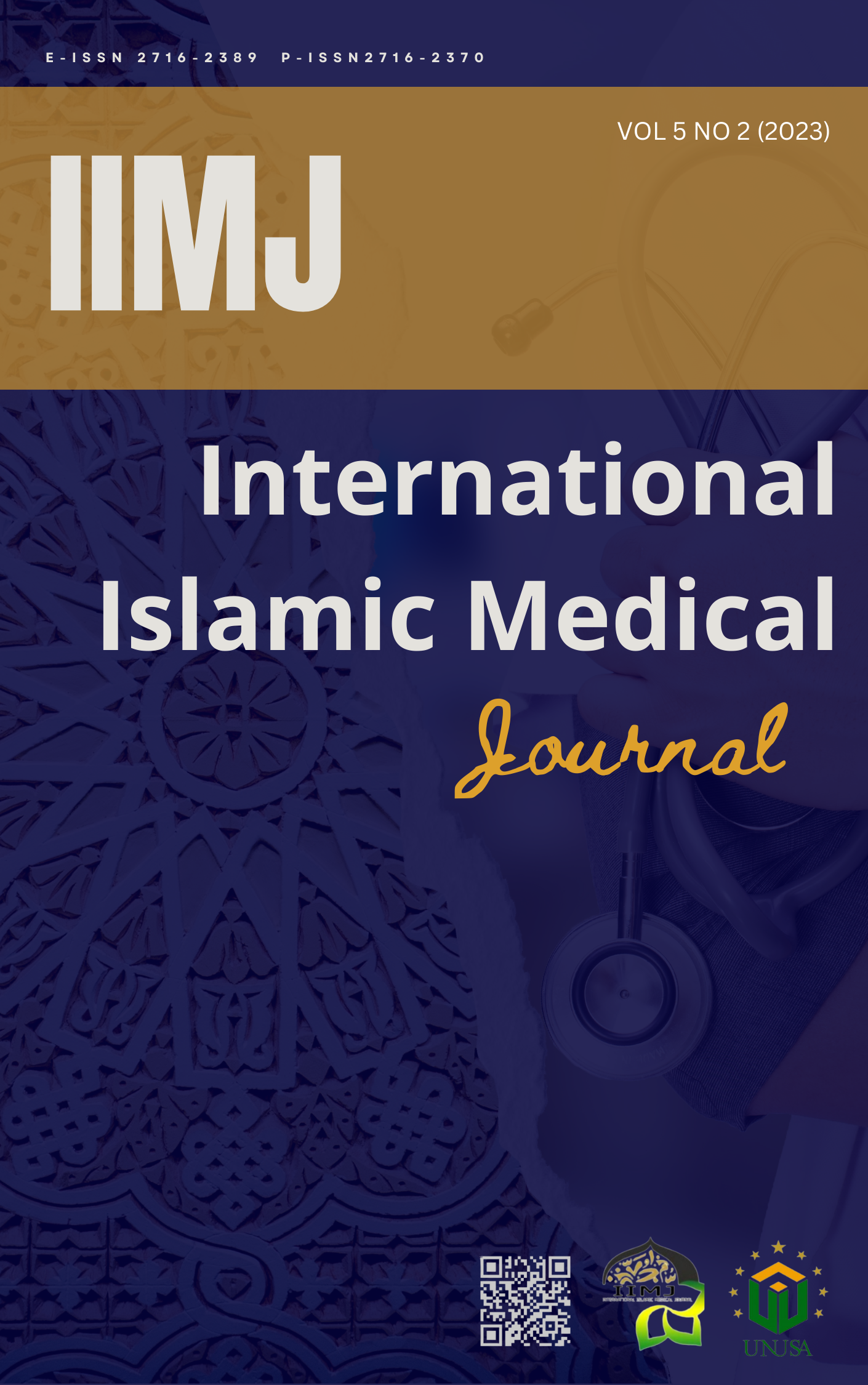The Relationship between The Characteristics of Type 2 Diabetes Mellitus Patients and The Chronic Kidney Disease Stage during The COVID-19 Pandemic at RSI Jemursari Surabaya
Main Article Content
Abstract
Introduction: The prevalence of diabetes mellitus has risen globally, posing a substantial health challenge, with a marked increase reported in both developed and developing nations. Diabetes is a primary contributor to the global prevalence of Chronic Kidney Disease (CKD). During the pandemic, there is a considerable challenge, especially for CKD patients, including a loss in health services, vulnerability to COVID-19 infection, stressful events during social distancing, and a decrease in therapy adherence. Hence, the COVID-19 pandemic may give rise to various characteristics in individuals with chronic kidney disease.
Objective: To investigate the correlation between the characteristic of patients with type 2 diabetes mellitus and the chronic kidney disease (CKD) stage at RSI Jemursari Surabaya during the COVID-19 pandemic.
Methods: An observational analytical cross-sectional study was conducted on individuals with chronic kidney disease (CKD) previously diagnosed with diabetes mellitus (DM) during the COVID-19 pandemic from 2020 to 2022. A total of 169 samples were obtained using a simple random sampling method. The variables considered include age, gender, HbA1c, blood pressure, cardiovascular comorbidities, Pulmonary comorbidities, and history of COVID-19.
Results: The study demonstrated a significant correlation between blood pressure and kidney function tests, including blood creatine level, BUN, and eGFR, with CKD stage (P<0.05). Randomised blood glucose also has a significant correlation to the CKD stage. No notable correlation was observed among age, gender, HbA1c levels, cardiovascular comorbidities, pulmonary comorbidities, and history of COVID-19.
Conclusions: The presence of hypertension and abnormal kidney function test results correlate with the stage of chronic kidney disease (CKD) during a pandemic.
Downloads
Article Details
Copyright (c) 2024 Betta Mega Oktaviana, Akbar Reza Muhammad, Danny Irawan, Effendi, Adyan Donastin, Rifka Windi Agustiandani, Andhien Syifa’ Tsabita

This work is licensed under a Creative Commons Attribution-ShareAlike 4.0 International License.
References
IDF Diabetes Atlas. Diabetes around the world in 2021. IDF Diabetes Atlas [Internet]. 2021; Available from: https://diabetesatlas.org
Carrillo-Larco RM, Barengo NC, Albitres-Flores L, Bernabe-Ortiz A. The risk of mortality among people with type 2 diabetes in Latin America: A systematic review and meta-analysis of population-based cohort studies. Diabetes Metab Res Rev. Diabetes Metab Res Rev; 2019;35(4). DOI: 10.1002/DMRR.3139
Regina CC, Mu’ti A, Fitriany E. Diabetes Mellitus Type 2. Verdure: Health Science Journal [Internet]. StatPearls Publishing; 2022 [cited 2023 Mar 15];3(1):8–17. Available from: https://www.ncbi.nlm.nih.gov/books/NBK513253/
Thomas MC, Brownlee M, Susztak K, Sharma K, Jandeleit-Dahm KAM, Zoungas S, et al.Diabetic kidney disease. Nature Reviews Disease Primers 2015 1:1. Nature Publishing Group; 2015;1(1):1–20. DOI: 10.1038/nrdp.2015.18
Farah RI, Al-Sabbagh MQ, Momani MS, Albtoosh A, Arabiat M, Abdulraheem AM, et al. Diabetic kidney disease in patients with type 2 diabetes mellitus: a cross-sectional study. BMC Nephrol. BioMed Central Ltd; 2021;22(1):1–8. DOI: 10.1186/S12882-021-02429- 4/FIGURES/2
Abdulaziz Al-Muhanna F, Ibraham Ali Albakr W, Subbarayalu AV, Cyrus C, Ahmed Aljenaidi H, Ali Alayoobi L, et al. Impact of COVID-19 on Kidney of Diabetic Patients. Medicina (B Aires). Multidisciplinary Digital Publishing Institute (MDPI); 2022;58(5). DOI: 10.3390/MEDICINA58050644
Sidorenkov G, Navis G. Safety of ACE inhibitor therapies in patients with chronic kidney disease. Expert Opin Drug Saf. Expert Opin Drug Saf; 2014;13(10):1383–95. DOI: 10.1517/14740338.2014.951328
Diamantidis CJ, Cook DJ, Redelosa CK, Vinculado RB, Cabajar AA, Vassalotti JA. CKD and Rapid Kidney Function Decline During the COVID-19 Pandemic. Kidney Med. 2023;5(9):100701. DOI: 10.1016/j.xkme.2023.100701
Mohamed NE, Benn EKT, Astha V, Okhawere KE, Korn TG, Nkemdirim W, et al. Association between chronic kidney disease and COVID-19-related mortality in New York. World J Urol. 2021;39(8):2987–93. DOI: 10.1007/s00345-020-03567-4
Mathew RO, Zhang J, Yang X, Chen S, Olatosi B, Li X. Incidence of Chronic Kidney Disease Following Acute Coronavirus Disease 2019 Based on South Carolina Statewide Data. J Gen Intern Med. 2023;38(8):1911–9. DOI: 10.1007/s11606-023-08184-6
Haruhara K, Tsuboi N, Koike K, Fukui A, Miyazaki Y, Kawamura T, et al. Renal histopathological findings about ambulatory blood pressure in chronic kidney disease patients. Hypertension Research. 2015;38(2):116–22. DOI: 10.1038/hr.2014.140
Dhaun N, Goddard J, Webb DJ. The endothelin system and its antagonism in chronic kidney disease. J Am Soc Nephrol. 2006;17(4):943–55. DOI: 10.1681/ASN.2005121256
Fine LG, Norman JT. Chronic hypoxia as a mechanism of progression of chronic kidney diseases: from hypothesis to novel therapeutics. Kidney Int. 2008;74(7):867–72. DOI: 10.1038/ki.2008.350
Rahman GS, Ridwan M, Nora H, Syukri M, Ismida FD. The pandemic of COVID-19 decreased adherence to treatment among hypertension patients at Dr. Zainoel Abidin Hospital. Trends in Infection and Global Health. 2021;1(2):58–65. DOI: 10.24815/tigh.v1i2.22418
Gotanda H, Liyanage-Don N, Moran AE, Krousel-Wood M, Green JB, Zhang Y, et al. Changes in Blood Pressure Outcomes Among Hypertensive Individuals During the COVID- 19 Pandemic: A Time Series Analysis in Three US Healthcare Organizations. Hypertension. 2022;79(12):2733–42. DOI: 10.1161/HYPERTENSIONAHA.122.19861
Honardoost M, Janani L, Aghili R, Emami Z, Khamseh ME. The Association between Presence of Comorbidities and COVID-19 Severity: A Systematic Review and Meta- Analysis. Cerebrovasc Dis. 2021;50(2):132–40. DOI: 10.1159/000513288
Li Z, Liang X, Liu S, Ye Z, Chen Y, Wang W, et al. Pulmonary hypertension: epidemiology in different CKD stages and its association with cardiovascular morbidity. PLoS One. 2014;9(12):e114392. DOI: 10.1371/journal.pone.0114392
Boiko O, Rodionova V, Shevchenko L. Features of Kidney Function in Patients With Comorbidity of Arterial Hypertension and Chronic Obstructive Pulmonary Disease. Cureus. 2022;14(11):e31828. DOI: 10.7759/cureus.31828
Gok M, Cetinkaya H, Kandemir T, Karahan E, Tuncer İB, Bukrek C, et al. Chronic kidney disease predicts poor outcomes of COVID-19 patients. Int Urol Nephrol. 2021;53(9):1891– 8. DOI: 10.1007/s11255-020-02758-7
Kuo I-C, Lin HY-H, Niu S-W, Hwang D-Y, Lee J-J, Tsai J-C, et al. Glycated Hemoglobin and Outcomes in Patients with Advanced Diabetic Chronic Kidney Disease. Sci Rep. 2016;6(1):20028. DOI: 10.1038/srep20028
Mak RHK. Impact of End‐Stage Renal Disease and Dialysis on Glycemic Control. Semin Dial. 2000;13(1):4–8. DOI: 10.1046/j.1525-139x.2000.00007.x
Sultan BO, Fouad AM, Zaki HM. Adherence to hemodialysis and medical regimens among patients with end-stage renal disease during COVID-19 pandemic: a cross-sectional study. BMC Nephrol. 2022;23(1):138. DOI: 10.1186/s12882-022-02756-0

